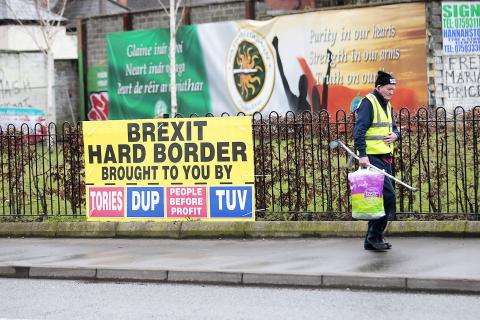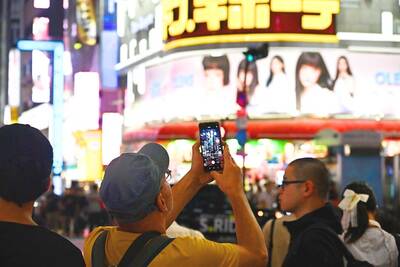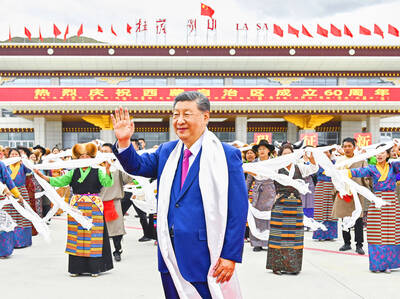Northern Ireland is to hold snap elections today in a bid to resolve a political crisis precipitated by Brexit as bad blood and allegations of corruption threaten to rock a delicate peace in the province.
Long-simmering tensions boiled over in January when deputy first minister Martin McGuinness of the Sinn Fein party quit, saying he could no longer work with First Minister Arlene Foster from the rival Democratic Unionist Party (DUP).
That triggered fresh elections to the Northern Ireland Assembly, a semi-autonomous body that has powers devolved from London over matters such as health, education and the local economy.

Photo: AP
If fences cannot be mended between Sinn Fein and the DUP after the elections, the assembly’s executive could be suspended and the province fully governed from London.
In the assembly elections in May last year, the Protestant, conservative and pro-British DUP won 38 seats in the 108-seat assembly. Sinn Fein — Catholic, socialist and Irish Republican — won 28 seats.
Polls and experts predict this week’s election will produce a result mirroring last year’s outcome, meaning deadlock.
McGuinness resigned in protest over a botched “green” heating scheme, the breaking point after months of tensions with the DUP.
While deeply engrained historical enmity persists between the parties, they have also been divided by Brexit.
The DUP backed the UK leaving the EU, while Sinn Fein wanted the UK to stay within the bloc.
During a televised debate on Tuesday, Michelle O’Neill, who replaced McGuinness as the head of Sinn Fein in Northern Ireland, said the DUP’s pro-Brexit view was “absolutely disgusting.”
“I think it is disappointing and disgraceful that the DUP have taken a stance against the majority of the people here,” she said.
In Northern Ireland, 55 percent voted Remain in the EU referendum in June last year.
Across the UK as a whole, 52 percent voted Leave.
“Brexit sped into the political crisis because Brexit is a highly divisive issue between unionists and [Irish] nationalists,” said Jonathan Tonge, a politics professor at Liverpool University and an author of several publications on Northern Irish politics.
“Brexit is a disaster for Northern Ireland on so many levels,” he said. “The most disastrous thing would be the return of a border ... which will greatly offend nationalists.”
The open frontier between Northern Ireland and the Republic of Ireland is the UK’s only land border with EU territory.
Border checkpoints are a memory of Northern Ireland’s violent past — “The Troubles” — of three decades of strife in which more than 3,500 people were killed.
With Britain seeking to pull out of the European single market some worry about customs posts being installed, damaging cross-border trade and weakening the relative stability of the last 20 years.
The elections and the border issue are being closely watched.
British Secretary of State for Northern Ireland James Brokenshire was scheduled yesterday to travel to Brussels, where European Commission President Jean-Claude Juncker last week stressed the importance of the 1998 peace deal.
“The Irish and British have worked hard to have it and in no way should it become under risk,” Juncker said, after talks with Irish Prime Minister Enda Kenny.
Former US senator George Mitchell, who chaired the talks that led to the Good Friday agreement, said the EU had helped to bring Britain and Ireland to the negotiating table.
“I think the UK being out of the European Union may reduce the prospect for further cooperation,” he told Sky News on Sunday.
The last opinion poll ahead of the vote, of 1,580 people surveyed online by LucidTalk between Friday last week and Sunday, put the DUP on 26 percent and Sinn Fein on 25 percent.
In terms of seats, the DUP is expected to win 29 or 30, with Sinn Fein on 26 or 27 in a new 90-seat assembly configuration, Tonge said.
In these circumstances, the DUP is again expected to nominate Foster as first minister, leaving matters no further forward than before the election.
Brokenshire would then likely suspend devolution while he tries to broker a deal between the DUP and Sinn Fein.
However, “it’s difficult to see what the deal would be,” Tonge said.

Ten cheetah cubs held in captivity since birth and destined for international wildlife trade markets have been rescued in Somaliland, a breakaway region of Somalia. They were all in stable condition despite all of them having been undernourished and limping due to being tied in captivity for months, said Laurie Marker, founder of the Cheetah Conservation Fund, which is caring for the cubs. One eight-month-old cub was unable to walk after been tied up for six months, while a five-month-old was “very malnourished [a bag of bones], with sores all over her body and full of botfly maggots which are under the

BRUSHED OFF: An ambassador to Australia previously said that Beijing does not see a reason to apologize for its naval exercises and military maneuvers in international areas China set off alarm bells in New Zealand when it dispatched powerful warships on unprecedented missions in the South Pacific without explanation, military documents showed. Beijing has spent years expanding its reach in the southern Pacific Ocean, courting island nations with new hospitals, freshly paved roads and generous offers of climate aid. However, these diplomatic efforts have increasingly been accompanied by more overt displays of military power. Three Chinese warships sailed the Tasman Sea between Australia and New Zealand in February, the first time such a task group had been sighted in those waters. “We have never seen vessels with this capability

A Japanese city would urge all smartphone users to limit screen time to two hours a day outside work or school under a proposed ordinance that includes no penalties. The limit — which would be recommended for all residents in Toyoake City — would not be binding and there would be no penalties incurred for higher usage, the draft ordinance showed. The proposal aims “to prevent excessive use of devices causing physical and mental health issues... including sleep problems,” Mayor Masafumi Koki said yesterday. The draft urges elementary-school students to avoid smartphones after 9pm, and junior-high students and older are advised not

Chinese President Xi Jinping (習近平) attended a grand ceremony in Lhasa yesterday during a rare visit to Tibet, where he urged “ethnic unity and religious harmony” in a region where China is accused of human rights abuses. The vast high-altitude area on the country’s western edge, established as an autonomous region in 1965 — six years after the 14th Dalai Lama fled into exile — was once a hotbed for protest against Chinese Communist Party rule. Rights groups accuse Beijing’s leaders of suppressing Tibetan culture and imposing massive surveillance, although authorities claim their policies have fostered stability and rapid economic development in